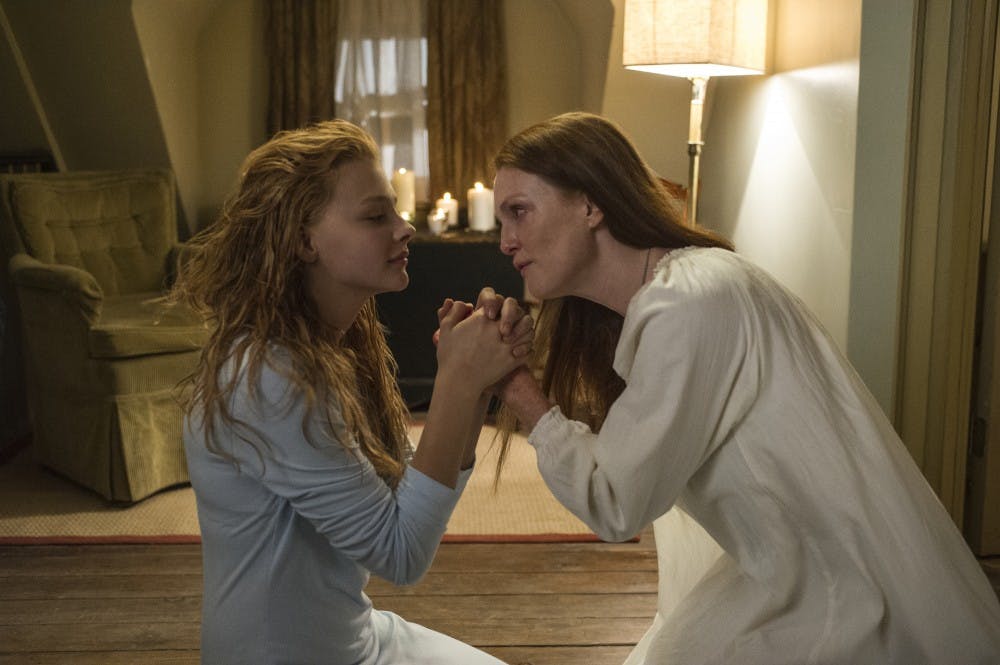Currently, the common thread for a remake production is that it’s a “re-imagining” and that it will be closer to the source material than before. However, these remakes comically fall short and are sometimes do not include everything.
Kimberly Peirce’s (“Stop-Loss”) “Carrie” falls into this category. A remake that bills itself as a reimagining of Stephen King’s 1974 novella, which eventually became an even more well-known 1976 film by Brian De Palma, is essentially just that. It purports to be a reworking of the novel, but the finished product is nothing more than an unnecessary update as a remake.
The story remains static, Carrie White (Chloe Moretz, “Kick-Ass 2”) is a socially fledgling high school student who has trouble adjusting the strata of her school. An incident occurs in the showers where human biology unexpectedly hits and Carrie begins to hyperventilate in front of a gaggle of popular girls, including our main antagonists Sue Snell (Gabriella Wilde, “The Three Musketeer”) and Chris Hargensen (Portia Doubleday, “Youth in Revolt”).
Hargensen posts a video of their reign of terror against Carrie and Mrs. Dejardin (Judy Greer, “Love & Other Drugs”) is tasked with laying down the law against Hargensen, Snell and her gang using prom as a bargaining tool.
From there grows the conflicts that propel “Carrie” to its fiery conclusion. There’s no secret what it is, and “Carrie” builds its tension on the audience knowing it as well, but some would deem it a cultural milestone where Sissy Spacek unleashes holy hell on a high school gym. “Carrie” follows along those same lines, deviates in others, but remains uneven. The novels piecemeal reportage, told as collection of biographical and narrative material, would have been infinitely more intriguing, here we only get a minor glimpse of what could have been at the end.
Julianne Moore’s presence, who plays Carrie’s mother Margaret, is eventually what undoubtedly sets “Carrie” into its disturbing and unsettling tone. Margaret, prone to fits of self-immolation, is a bible beater and she uses it it to beat Carrie into submission in the eyes of a higher power. Moore is terrifying as an ashen ghostly figure and when she appears on screen with a sunken pale face standing in the yard in delirium, “Carrie” satisfies in delivering a dynamic portrait of Margaret’s insanity.
It’s the portrait of everyone else that remains to be unsatisfying. Carrie’s high school, which has the aesthetic quality of an Urban Outfitters outlet, is filled with vacuous people and when Pierce trains her camera on those male athletes and overly involved female aggressors, there’s nothing there except when we see how ruthless they can be. Even then they become cartoonish mustache sneering villains.
Where King’s novel is about understanding what happens when bullying goes too far and the retribution is ultimately costly, “Carrie,” both De Palma and Pierce’s new adaptation, are about conflicting aims and how the set aflame to one another (literally). Margaret’s violent mercy versus Mrs. Desjardin’s flawed grace. Religious upbringing versus Carrie’s search for individual meaning. Sue Snell’s search for mercy against a group of girls who demand cohesion in their mutual, irrational hatred of Carrie.
There’s probably someone who will get satisfaction out of all the bilious revenge Carrie takes upon her own aggressors. Many will laugh at Carrie for her newfound superhero powers, although that might not be wise, but somehow when presented with a chance to put things back together, “Carrie” would rather savagely burn it asunder once again.





